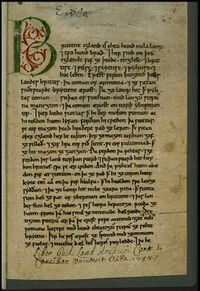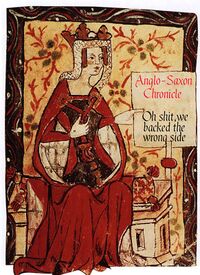Anglo-Saxon Chronicle

The Anglo-Saxon Chronicle was an early English newspaper that was first published in 449 to mark the arrival of Hengest and Horsa to Kent. It was written in Ye Olde Engerlanderisch which makes it difficult to read or understand today. The paper went through many changes including the sacking of its main scriptorium in Winchester cathedral by the Vikings. It was closed down on the orders of King Henry II in 1154 who instructed that from that date onwards everything was to be published in Norman French. A short lived successor Plantagenet Unbiased Free Press only lasted a few decades. Today copies of the Anglo-Saxon Chronicle only exist in the form of compilations and greatest hits.
The Anglo-Saxon Chronicle was written entirely by hand and relied on monks to make stuff up report on England. Contributors to the newspaper included St. (H)Ives, St. Oswald the Filthy and St. Swithun who worked as a weather forecaster. Swithun's catchphrase was It's going to rain for the next 40 days. King Alfred the Great wrote a cookery column about baking cakes, though his baking time recommendations were disputed by those who followed the monarch's recipe.
Origins[edit]
According to the Venerable Bede, the Anglo-Saxon Chronicle may have started in Germany in the 440s but left there when Attila the Hun tried to buy it and combine it with the Hun Fun Post. The editorial team chose to flee to Britannia. The earliest surviving news story mentions the victories of the Hengist and Horsa against the local pansified Celts (aka the Romanised Britons) in the 440s and 450s. However, as Hengist and Horsa were Jutes, the Anglo-Saxon Chronicle was critical of their economic policies and the sharing out of loot.
Coverage of King Arthur[edit]
Circulation of the Anglo-Saxon Chronicle experienced a steady growth in the 5th century but suffered a big drop in sales when the British leader King Arthur drove the newcomers back towards the East in a series of battles. The Anglo-Saxon Chronicle lamented these losses but predicted that the Celts couldn't run a bath without Arthur and that they would end up killing each other. This came true and by the end of the 6th century copies of the Anglo-Saxon Chronicle could be found as far west as Devon and Wales.
Christianity[edit]
The Anglo-Saxon Chronicle was initially hostile to the new Jesus religion. It heavily criticised King Ethelbert of Kent for letting these 'priggish Christians' into the country to preach this religious nonsense. However, under a lot inducements from the Christians and a regular stream of religious advertising (Visit Rome for some Holy Bones Promotions), the Anglo-Saxon Chronicle allowed itself to be bought and dictated to. This lead to the setting up of rival newspapers to the Anglo-Saxon Chronicle. They included such titles as the Anglo-Saxon Daily Mail and the Anglo-Saxon Sun, the latter being especially profitable for its regular use of Pagan Pin-Ups.
But business is business and so by the end of the 7th century and early 8th century, the Anglo-Saxon Chronicle was again enjoying its position as the first Parchment of Record. This was also the time the very successful saga Beowulf was run by the paper in an easy-to-read-and-then-wipe-your-bottom-with-it-after sheepskin edition. Then came the Vikings.
Vikings[edit]
The Vikings couldn't read English. In fact they could read their own language either but did set up a new rival to the Anglo-Saxon Chronicle called the Danelaw War Horn. This paper was initially purely pagan with regular coverage of sackings, pillaging and general bad behaviour in monasteries. It gave the Anglo-Saxon Chronicle a severe challenge until once again mass Christian advertisers made a serious push to bring the Vikings to God. They succeeded. The Danelaw War Horn survived but was much diminished for many years.
Murder all Foreigners![edit]
The Anglo-Saxon Chronicle backed Alfred the Great as the greatest leader of Britain since Moses. It backed the re-conquest of the country from the Vikings and encouraged a new name for the people as 'the English' instead of their previous self identification as 'Saxon, Mercian and Awkward Angles'.
When the line of English monarchs ended up with Ethelred the Unready at the end of the 10th century, the Anglo-Saxon Chronicle refused to endorse the king's policy of killing every known viking in the country. This policy was backed by the Anglo-Saxon Daily Express but not the Anglo-Saxon Chronicle which was now gaining a reputation of 'inclusiveness' rather than division.
Hold back the Waves[edit]
When the Danes conquered England in 1016, the Anglo-Saxon Chronicle backed the new overlords. There was talking of changing the paper's name to the Anglo-Danish and Saxon Chronicle to show their support for King Cnut (Canute). Unfortunately an edition of the paper employed some less than literate writers who transposed the letters in Cnut's name. This led to a huge fine, a large apology and the amputation of the hands who had written the obscenity.
In perhaps a response to this error, the Anglo-Saxon Chronicle became a less than critical newspaper and advertised Cnut's god given powers to hold back the waves and turn water into coca-cola.
William the Conqueror[edit]
The paper's decline coincided with a change of government in 1066. The Anglo-Saxon Chronicle welcomed the seizure of power in England by King Harold II and his war against the Norwegians and 'traitors' in the North of England. However the Battle of Hastings saw Harold dead and a newcomer become king. William the Conqueror spoke only broken English and preferred to conduct all his business in French. The Anglo-Saxon Chronicle tried to adapt, again a name change was mooted to Anglo-Norman Chronicle but this didn't come about. The Anglo-Saxon readership never warmed to Willy or his family.
End of the Chronicle[edit]
Writing anything in Anglo-Saxon became unfashionable by the 12th century. Only the peasants now spoke the language. The elites conversed in French or Latin. The Anglo-Saxon Chronicle did bring out editions in both these languages.
Once again the Anglo-Saxon Chronicle were caught out backing the wrong king to the throne of England in 1135. The succession was disputed between 'Waltzing' Matilda, daughter of King Henry I and Stephen of Blouse (unbuttoned). The Anglo-Saxon Chronicle fiercely supported Stephen as the next king, writing that any woman ruling any Christian country was both immoral and 'against the laws of nature'. The paper started to woodblock a simple message on the masthead. Anglo-Saxon Chronicle: Engerland Forever!
In 1154 King Henry II (son of Matilda) stopped ordering copies for the court to read. The Anglo-Saxon Chronicle was over. Matilda was given the final edition. It was last seen in the royal privy.



